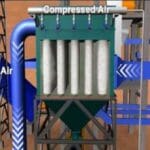- Course No E – 1821
- PDH Units: 4
No data found for Custom Course Number
No data found for Custom Course Units
- Course No E – 1821
- PDH Units: 4
Intended Audience: Mechanical & Civil Engineers
Credits: 4 PDH Units
Most modern machinery today uses fluid power principles to do work so as to make our lives easier. Think about your car's brakes and how, by stepping on the brake pedal, you apply stopping pressure on the brakes on all four wheels. The ease with which we drive and steer our cars today is because of fluid power. You see fluid power at automobile service centers lifting the cars so that mechanics can work underneath them, and many elevators are hydraulically-operated using the same technique. There are numerous such applications that rely on fluid power that are obviously very adaptable, but how do they actually work? This 4-hr course provides an understanding of basic hydraulics principles and presents an overview of the fluid power system, and introduces both Pascal's Law and Bernoulli's Principle. This course material is based entirely on the NAVEDTRA NONRESIDENT TRAINING COURSE 14105 titled “Fluid Power” wherein, the reader will be introduced to three chapters’ ---- Chapter -1: Introduction to Fluid Power Chapter -2: Forces in Liquid Chapter -3: Hydraulic Fluids
Learning Objectives:
At the successful conclusion of this course, you will learn the following knowledge and skills:- Learn the behavior of liquids at rest and the factors affecting transmission of forces through liquids
- Describe the fluid properties such as density, viscosity, flow rates, velocity, temperature, pressure, head and their relationships
- Learn Pascal’s law and describe pressure and force in fluid power systems
- Learn the behavior of liquids in motion and the factors involved in flow
- Learn hydraulic principles – calculation of required pressure, required flow and required power
- Understand the Bernoulli’s principle and learn how to calculate the fluid velocity or flow rate in a specified fluid system using the continuity equation
- Understand the relationship of force, pressure and head
- Understand the operation of basic hydraulic components and their application in hydraulic jacks and hydraulic brakes
- Learn the quality of fluids acceptable for hydraulic systems
- Learn the safety precautions when handling potentially hazardous fluids
Once completed, your order and certificate of completion will be available in your profile when you’re logged in to the site.










